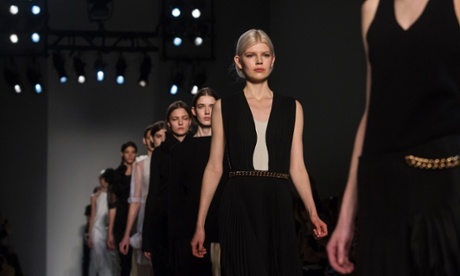
Colin McDowell used to be the fashion writer for the Sunday Times in the UK, although he said that he didn't do that much for them now – a state of affairs that will continue if his editor finds out that he was teasing her in front of a live audience ("she's called Tiffanie spelt IE – it's very worrying, like being called Chardonnay," he purred).
His talk at Sydney writers' festival, Shopping for Miracles, was a mixture of the sharp and the woolly. "If you read too many books they'll scramble your head – not this book, though," he remembered, referring to his latest, The Anatomy of Fashion. He was dressed in a suit, and declared his pity for men who don't dress their age.
"Everyone wants to live in Simpsons land," he said. "You see men in baggy shorts and hideous little trainers – these are captains of industry! Isn't it pathetic? Isn't it sad that grown men want to dress like 14-year-olds? I blame their mothers." (If this sounds mean, it was funny in the room – and I speak as a middle-aged man in trainers myself.)
As you'd expect from such a seasoned writer on the rag trade, McDowell was great on the transformative power of fashion, although his description of London's Regent Street ("You can't move for Lithuanian shoplifters") won't have been to all tastes. He says that he often goes into a shop that he refused to name (but which was clearly Topshop in Oxford Circus) and watches people as they come out of the changing room. "The women are a mixture of the purity of Kylie Minogue and the horror of Lady Gaga. The men are rap stars." I think he meant it as a compliment.
McDowell was candid about the relationship between advertising and editorial in fashion magazines, where companies demand (and get) clothes in fashion stories if they buy advertising space. He said that his proudest moment was when Giorgio Armani threatened to pull his advertising from the Sunday Times (at £50,000 a page) because of a review McDowell had given one of his shows, and had his bluff called. He's proud to (he claimed) have been banned from more fashion shows than any other writer. "When they want to silence you, you know you're on the right track."
The talk was studded with gossip. Valentino loves dogs, and introduced McDowell to "the one that shares my bed". Fashion itself is "very avaricious but very generous", exemplified by a charity action to which Tom Ford donated a bag that was mink on one side and crocodile skin on the other. McDowell rates Victoria Beckham – she's "totally hands on" and "here to stay" as a fashion designer. He was very funny about the atmosphere of posh clothes shops: "they're like mausoleums, these great big shops that no-one dares go into. Churches that turn into prisons ... 'Will I never get out if I don't buy anything?'"
When asked about the democratisation of fashion, McDowell pointed out that over the past three or four years, there has been a booming demand for haute couture thanks to the rise of the super-rich, particularly in Asia. He said he met a woman at a show for Chanel couture who was "physically very square" but would buy four couture outfits for herself and two each for her daughters every season – an outlay of (at a conservative estimate) some $US80,000. So the opposite of democratisation, then – though McDowell said that natural beauty will beat a fancy outfit any day. "Whether you're straight or gay, a pair of pecs is going to beat any shirt."

